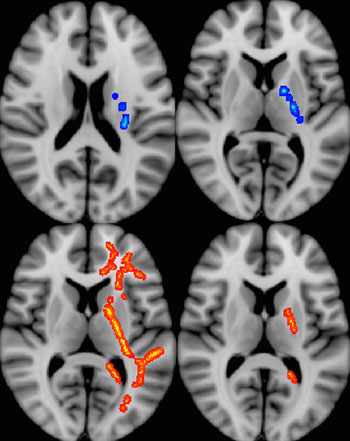MRI-DTI Useful in Predicting Long-Term Effects of Combat-Induced MTBI
By MedImaging International staff writers
Posted on 28 Mar 2016
Researchers in the US have found that MRI-DTI measurements correlate with clinical outcomes such as symptom severity and healthcare utilization in veterans with Mild Traumatic Brain Injury (MTBI).Posted on 28 Mar 2016
Diffusion Tensor Imaging (DTI) is a Magnetic Resonance Imaging (MRI) technique that can be used to measure the integrity of white matter in the brain's signal-transmitting nerve fibers.

Image: MRI-DTI scans of the brains of US military veterans with MTBI (Photo courtesy of RSNA).
The researchers studied 57 military veterans, diagnosed with MTBI after their return from combat, and with an average period of 3.8 years between injury and post-deployment evaluation. The average follow-up duration was 1.4 years.
The study was published in the March issue of the journal Radiology and was carried out by researchers at the Philadelphia VA Medical Center (Philadelphia, USA). There has been a dramatic rise in the number of cases of combat-related MTBI in US service members. According to the US Armed Forces Health Surveillance Center more than 300,000 soldiers were diagnosed with MTBI between 2000 and 2015. The diagnosis of MTBI remains challenging, and it can be confused with other conditions such as Post-Traumatic Stress Disorder (PTSD).
The results of the study show significant correlations between initial post-deployment DTI measurements and neuro-behavioral symptoms. The measurements also correlated with the timing of injury, subsequent functional outcomes, and the frequency of healthcare visits made by veterans with MTBI. According to the researchers, loss of white matter integrity, is directly related to clinical outcomes in veterans who suffered concussion or Mild Traumatic Brain Injury (MTBI) during combat.
Jeffrey B. Ware, MD at the Philadelphia VA Medical Center, said, "All conventional MR images were interpreted as normal. We retrospectively analyzed the data from the DTI sequence to derive measures of white matter integrity, which we compared to clinical measures and subsequent outcome measures 6 months to 2.5 years after the initial evaluation. Our findings suggest that differences in white matter microstructure may partially account for the variance in functional outcomes among this population. In particular, loss of white matter integrity has a direct, measurable effect. It was illuminating to see the association between measures of white matter integrity and important outcomes occurring months to years down the road in our study population."
Related Links:
Philadelphia VA Medical Center














